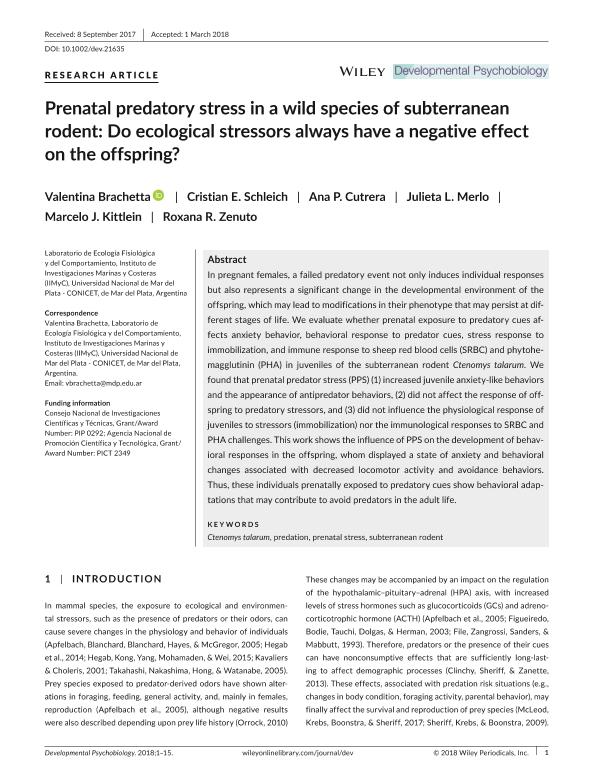Artículo
Prenatal predatory stress in a wild species of subterranean rodent: Do ecological stressors always have a negative effect on the offspring?
Brachetta, Valentina ; Schleich, Cristian
; Schleich, Cristian ; Cutrera, Ana Paula
; Cutrera, Ana Paula ; Merlo, Julieta
; Merlo, Julieta ; Kittlein, Marcelo Javier
; Kittlein, Marcelo Javier ; Zenuto, Roxana Rita
; Zenuto, Roxana Rita
 ; Schleich, Cristian
; Schleich, Cristian ; Cutrera, Ana Paula
; Cutrera, Ana Paula ; Merlo, Julieta
; Merlo, Julieta ; Kittlein, Marcelo Javier
; Kittlein, Marcelo Javier ; Zenuto, Roxana Rita
; Zenuto, Roxana Rita
Fecha de publicación:
21/05/2018
Editorial:
John Wiley & Sons Inc
Revista:
Developmental Psychobiology
ISSN:
0012-1630
e-ISSN:
1098-2302
Idioma:
Inglés
Tipo de recurso:
Artículo publicado
Clasificación temática:
Resumen
In pregnant females, a failed predatory event not only induces individual responses but also represents a significant change in the developmental environment of the offspring, which may lead to modifications in their phenotype that may persist at different stages of life. We evaluate whether prenatal exposure to predatory cues affects anxiety behavior, behavioral response to predator cues, stress response to immobilization, and immune response to sheep red blood cells (SRBC) and phytohemagglutinin (PHA) in juveniles of the subterranean rodent Ctenomys talarum. We found that prenatal predator stress (PPS) (1) increased juvenile anxiety-like behaviors and the appearance of antipredator behaviors, (2) did not affect the response of offspring to predatory stressors, and (3) did not influence the physiological response of juveniles to stressors (immobilization) nor the immunological responses to SRBC and PHA challenges. This work shows the influence of PPS on the development of behavioral responses in the offspring, whom displayed a state of anxiety and behavioral changes associated with decreased locomotor activity and avoidance behaviors. Thus, these individuals prenatally exposed to predatory cues show behavioral adaptations that may contribute to avoid predators in the adult life.
Palabras clave:
CTENOMYS TALARUM
,
PREDATION
,
PRENATAL STRESS
,
SUBTERRANEAN RODENT
Archivos asociados
Licencia
Identificadores
Colecciones
Articulos(IIMYC)
Articulos de INSTITUTO DE INVESTIGACIONES MARINAS Y COSTERAS
Articulos de INSTITUTO DE INVESTIGACIONES MARINAS Y COSTERAS
Citación
Brachetta, Valentina; Schleich, Cristian; Cutrera, Ana Paula; Merlo, Julieta; Kittlein, Marcelo Javier; et al.; Prenatal predatory stress in a wild species of subterranean rodent: Do ecological stressors always have a negative effect on the offspring?; John Wiley & Sons Inc; Developmental Psychobiology; 60; 5; 21-5-2018; 567-581
Compartir



